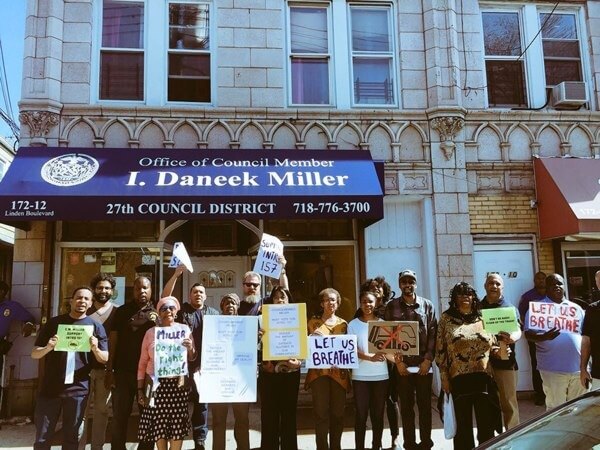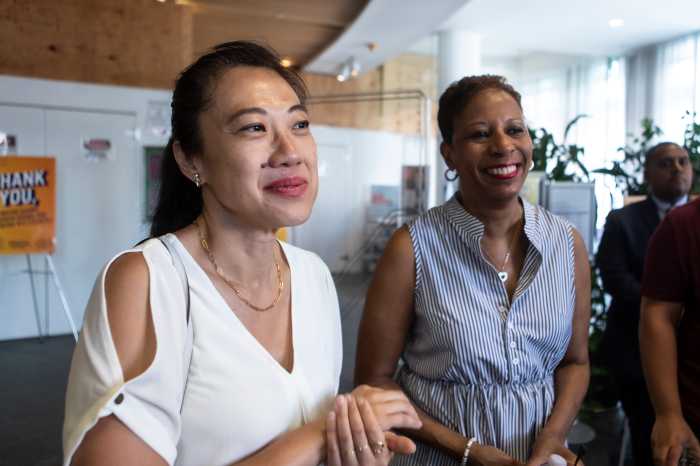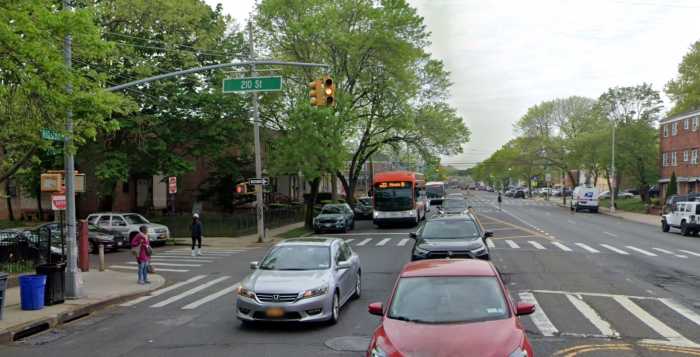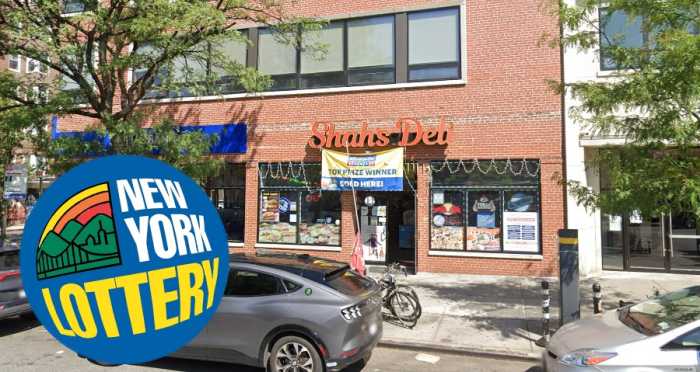By Naeisha Rose
Environmentalists and constituents of Councilman I. Daneek Miller (D-St. Albans) held a waste equity rally outside the elected official’s office last week in order to convince him to co-sponsor the new version of Intro 495-C, which was reintroduced in January.
The May 2 rally, which 20 people attended, was in response to the councilman refusing to vote on the Intro 495-C bill in December 2017, despite being one of its co-sponsors and biggest champions since 2014.
The purpose of both bills was to reduce the capacity of waste stations in overburdened districts, according to legis
The bills were rooted in the 2006 Solid Waste Management Plan, which was created to help communities in southeast Queens, north Brooklyn and the south Bronx that had 75 percent of the city’s trash, according to the city Department of Sanitation.
The plan would put caps on the amount of refuse sent to those communities, improve air quality, and cut traffic and pollution from long-haul trucks as the city builds Marine Transfer Stations across the city, according to Sanitation.
The city’s waste plan aimed to tackle the traffic, pollution and air quality problem by switching from long-haul trucking of refuse to marine and rail transfer, according to www.waste
It was estimated that truck travel could be cut by 60 miles and greenhouse gas emissions reduced to 34,000 tons, according to www.waste
The management plan will ultimately steer the waste away from commercial refuse facilities situated in the boroughs, and transfer it via fewer and greener trucks to boroughwide marine and rail stations, according the Solid Waste Management Plan. The trucks routes will be redirected away from most commercial roads and residential areas.
Bill Baker, a congregant of Allen AME Cathedral at 110-31 Merrick Blvd. in Jamaica, which is near Miller’s office, said that his wife and sons have developed asthma over the years and he attributed it to air pollution from waste facilities in the neighborhood, like American Recycling at 172-33 Douglas Ave. in Jamaica.
“The weather person said, ‘it’s going to be hot today. So be careful if you are asthmatic or have breathing problems,’” said Baker. “This made me anxious.”
Miller agrees that waste equity is necessary in southeast Queens, but believes a bill should also include safety standards and better wages for sanitation workers. After reviewing both bills and speaking to experts, he added that getting rid of the waste facilities may also lead to worse problems.
“I appreciate our community’s activist spirit and desire for swift action,” said Miller. “However, responsible policy development is neither quick nor easy, and requires research, collaboration and negotiation… I’ve been the most vocal champion for Environmental Justice in southeast Queens and remain deeply committed to that principle, which among other things includes working to pass a waste equity bill that adequately addresses the unique needs of our community.”
Labor activists agree with Miller, and believe sanitation workers could lose their union paying jobs if the caps go into effect immediately, especially since the Marine Transfer Stations won’t be finished until 2020, according to the mayor’s office.
The National Waste & Recycling Association, a private-sector waste trade group, said that sanitation workers earn $40,000 to $60,000 a year with benefits.
Executive Director Kendall Christiansen from New Yorkers for Responsible Waste Management and CEO Tom Grech of the Queens Chamber of Commerce are also concerned about the impact the transfer stations will have on small businesses in the city and Queens.
“The main problem is that you are eliminating choice and competition for the small businesses and the haulers that service them,” said Christiansen. “You are changing what is a competitive market, which means better service, better prices and innovation as well, because companies would try to get smarter and more efficient with how they operate.”
Christiansen believes the mayor’s system would be creating a monopoly “where no one can compete.”
Grech said it is the Chamber’s job to make sure the waste system is “fair and equitable for small businesses.”
“I understand the component [by the mayor] to have waste management companies work in a more coordinated way, but I’m worried about their cost going up,” said Grech. “As the city’s largest geographic borough, we have tens of thousands of businesses that depend upon steady pricing and regular relationships.”
Reach reporter Naeisha Rose by e-mail at nrose



































